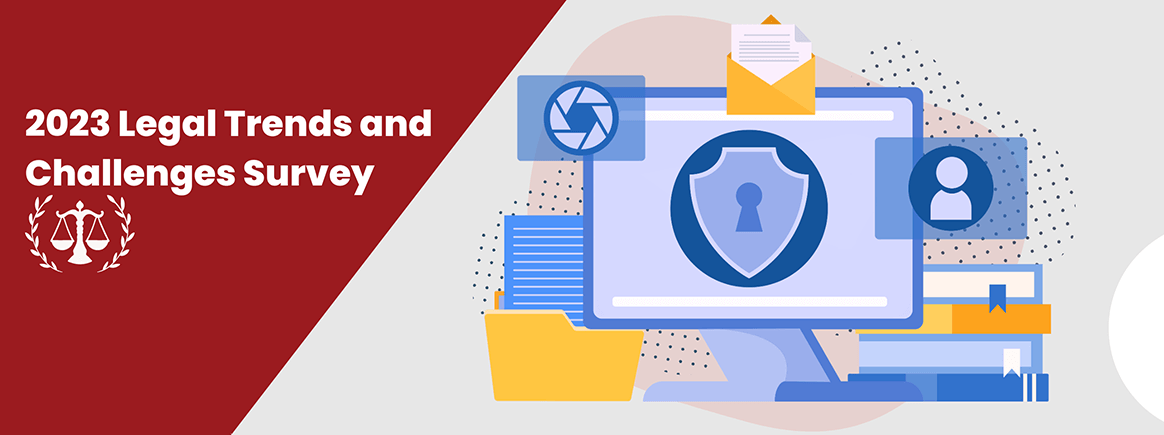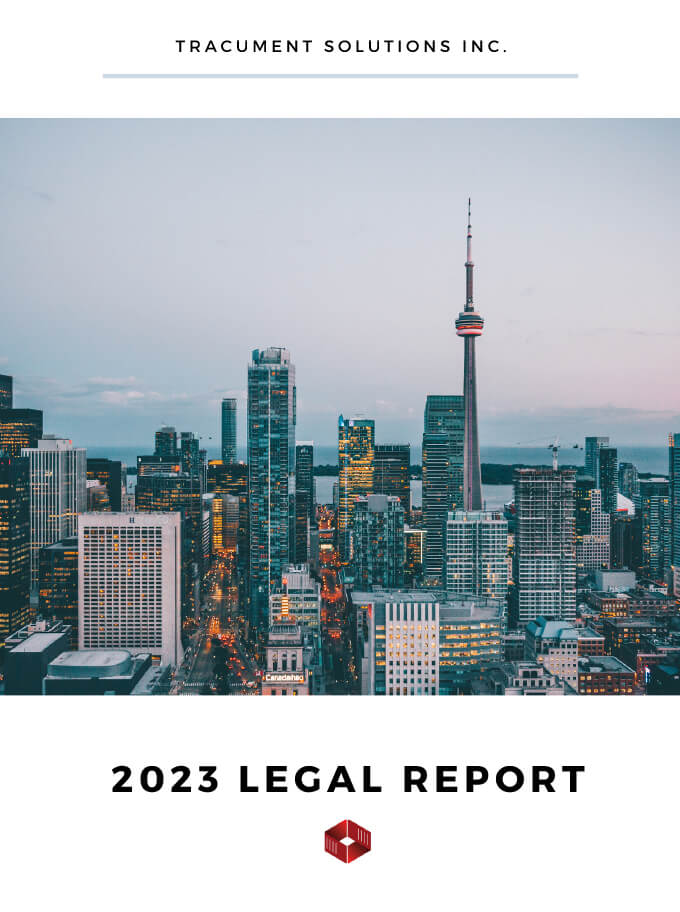
Law Firm Security Standards
Introduction
In the Canadian legal industry, the necessity for robust security standards and practices within law firms continues to grow. As legal practices transition into the digital realm, the safeguarding of sensitive client information and confidential case details has become paramount. Additionally, continued functionality of digital systems and software is necessary to a firm's profitability.
This transition is underscored by the rapid growth of cyber threats targeting law firms which highlights the urgent need for comprehensive security measures. For instance, in 2020 operations at two Manitoba law firms came to a virtual standstill after their staff were locked out of their computer systems by a cyber attack. Instances such as these serve as a stark reminder of the vulnerabilities within the legal industry. Moreover, the ethical duty of lawyers to protect client data is paired with legal and financial repercussions that stem from data breaches. As we navigate a world where privacy regulations such as PIPEDA and provincial laws like Ontario's PHIPA play a pivotal role, the fusion of technology and law requires a heightened focus on security practices.
This blog explores the multifaceted dimensions of law firm security standards, shedding light on their importance within individual law firms.
The Risks
Statistics reveal a disconcerting trend — that the legal industry ranks among the prime targets for cybercriminals. According to a report by the Canadian Centre for Cyber Security, incidents of cyber attacks on law firms have risen by an alarming 50% in the past two years alone. This unsettling increase serves as a clear indication that the legal industry is not immune to the pervasive threats posed by cyber adversaries.
While external breaches often make headlines, a significant portion of security incidents stem from within an organization. Among the various challenges faced by law firms, insider threats and employee negligence have emerged as additional vulnerabilities. Employees, whether inadvertently or maliciously, can compromise sensitive data, thereby jeopardizing the integrity of client and firm information. A study conducted by the Ponemon Institute revealed that 56% of data breaches within law firms were attributed to insider actions, further underlining the crucial role of comprehensive security policies that extend beyond external defense mechanisms. Aside from the immediate financial and legal consequences, the fallout from a data breach often involves extensive legal battles, regulatory fines, and potential lawsuits, draining resources and diverting focus from core legal activities. Clients may rightfully question a firm's commitment to safeguarding their sensitive information, leading to erosion of trust and the possibility of clients seeking legal services elsewhere.
Moreover, the interconnected nature of the legal industry amplifies the potential impact of a security breach. Law firms routinely collaborate with a network of clients, other law firms, and third-party vendors, all of whom rely on the confidentiality and security of shared information. A single breach can cascade through this web of relationships, affecting not only the firm, but also its partners.
Regulatory Framework
Considering the potential damage, Canada's thorough stance on privacy and data protection has led to the establishment of comprehensive legal guidelines that govern the security practices of law firms operating within its borders.
Canada's privacy landscape is governed by a combination of federal and provincial legislation, with the Personal Information Protection and Electronic Documents Act (PIPEDA) serving as the primary federal statute. PIPEDA outlines the rules and principles governing the collection, use, and disclosure of personal information, applying to organizations and professionals engaged in commercial activities. Additionally, provinces like British Columbia, Alberta, and Quebec have their own privacy laws which must be adhered to, reinforcing the importance of a multilayered approach to compliance.
Compliance with Canada's privacy and data protection laws is not merely a legal obligation, but a fundamental means of upholding client trust and maintaining the sanctity of lawyer-client privilege. Law firms hold a trove of sensitive client information, including financial records, legal strategies, and personal details, making them prime targets for cyberattacks and breaches. At the very least, by adhering to regulatory standards, law firms demonstrate their commitment to safeguarding client interests and preserving the confidentiality of sensitive communications.
Why stop there?
Canadian privacy regulations serve as the minimum standards required by law, but further work may be required. The global nature of legal practice demands that some law firms align their security measures with international best practices. Internationally recognized frameworks such as ISO 27001 provide a roadmap for establishing information security management systems (ISMS) that encompass risk assessment, incident response, and ongoing security improvement. Aligning with such standards not only enhances a law firm's overall security posture but also demonstrates a commitment to excellence on the global stage.
#ProtectingYourRightsAndYourBytes
The regulatory framework and compliance standards governing law firm security in Canada are designed to reinforce client trust and uphold confidentiality. By navigating the intricate landscape of privacy laws and embracing cybersecurity measures law firms can stand at the vanguard of safeguarding sensitive information in an ever-evolving digital era.
Three Best Practices for Law Firms
While the application of policies and procedures act as a foundation, law firms must recognize that their employees are the first line of defense against potential security breaches. A comprehensive employee training and awareness program is not just an investment; it is a necessity to foster a culture of security vigilance.
According to an IBM Cyber Security Intelligence Index Report, 95% of data breaches were attributed to human error, highlighting the critical role of employees in maintaining data integrity.
Establishing robust security standards is not only a legal requirement, but also a crucial element to enforcing security standards.
1. Robust Data Encryption Practices
When accessing documents, is there a record of who has done so and why? Does your firm have data breach insurance to cover the costs associated with a data breach? Are documents encrypted from at all points in transit and at rest?
Data encryption stands as one of the foremost pillars of law firm security standards. Encrypting sensitive data ensures that even if unauthorized access occurs, the information remains unintelligible to unauthorized parties. Tracument, for example, ensures that all data sent and received through the platform is encrypted and stored exclusively in Canada.
2. Multi-Factor Authentication for Software
Implementing multi-factor authentication (MFA) adds an extra layer of defense to software programs. By requiring clients and employees to provide two or more forms of verification before accessing sensitive information or engaging in transactions, law firms can significantly reduce the risk of unauthorized access. MFA methods such as biometric identification, one-time passwords, and security tokens enhance the integrity of client interactions and protect against unauthorized breaches.
3. Employee Training and Awareness Programs
Human error remains a leading cause of data breaches, underscoring the importance of comprehensive employee training and awareness programs. Regularly educating staff about cybersecurity best practices, recognizing phishing attempts, and maintaining strong password hygiene is essential. Passwords and people serve as another line of defense. Simulated phishing exercises can be employed to assess employees' preparedness and identify areas for improvement.
Empowered employees become the guardians of sensitive information, and fortified data practices serve as a defensive wall against potential threats. Such measures not only fortify the legal practice against evolving cyber threats but also uphold the trust and credibility that clients expect when entrusting their sensitive matters to legal professionals.
The Future of Cybersecurity
As technology evolves, so too do the methods of cyber attackers. Law firms must remain vigilant against threats such as ransomware attacks, data breaches, and supply chain vulnerabilities. Cybercriminals are adapting new tactics to exploit new avenues of attack.
To mitigate these evolving threats, law firms must cultivate a culture of continuous learning, staying abreast of the latest cybersecurity developments and investing in robust defense mechanisms. By anticipating and preparing for emerging threats, Canadian law firms can strengthen their defenses and ensure the continued protection of sensitive client information.
One example of an emerging type of security is blockchain technology.
The integration of blockchain technology holds significant promise for the legal sector, offering a novel approach to data integrity and transparency. By creating immutable, tamper-proof records of transactions and document exchanges, blockchain technology can enhance the credibility of legal documents, contracts, and evidence, bolstering trust in the legal process.
The adoption of blockchain technology could serve as a transformative force in ensuring the authenticity and veracity of legal information. By embracing blockchain's decentralized and secure nature, Canadian law firms can offer clients an additional layer of confidence in the integrity of their services
As firms fortify their security measures, they must strike a delicate balance between robust protection and the need for accessibility and convenience. Clients and legal professionals increasingly demand seamless remote access to documents and communication channels, necessitating the integration of user-friendly technologies.
The challenge lies in maintaining stringent security protocols while accommodating the evolving expectations of clients.
By implementing secure remote collaboration tools, multi-factor authentication, and encryption to safeguard sensitive data while enabling agile communication. This delicate equilibrium ensures that security remains uncompromised while providing the accessibility and convenience required in today's fast-paced legal landscape.
Anticipating the Future
The future of law firm security in Canada lies in the ability to anticipate and adapt to emerging trends and challenges. By fostering a culture of proactive cybersecurity, Canadian law firms can stay ahead of cyber threats, leverage cutting-edge technologies like blockchain, and harmonize security with convenience.
As Canada's legal sector continues to embrace digital transformation, law firms have a unique opportunity to set new standards for security, integrity, and client trust. By charting a course that navigates emerging challenges and harnesses innovative solutions, Canadian law firms can position themselves as pillars of resilience in the ever-evolving landscape of legal practice.
You may also like
Happy Holidays Message from David Swadden, CEO
December 18, 2025
We would like to wish all our clients and readers a wonderful holiday season filled with joy and laughter.
Tracument Holiday Schedule
December 11, 2025
We would like to update all our clients of our Holiday Schedule this holiday season!
Tracument Wrapped!
December 4, 2025
What 2025 Looked like for Tracument and for you!




